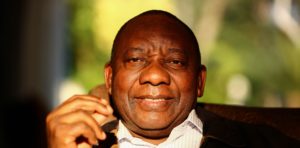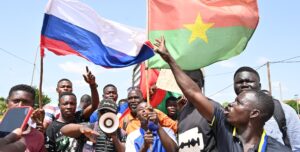Olive Schreiner, the South African author of The Story of an African Farm, surveyed her Edwardian society as an impoverished exile in London in a letter to a lifelong friend, John X Merriman. “A dead pall rests over the whole life of the people,” she despaired. “A passion for dress, luxury and gain is eating up the middle classes”; the whole press is in the hands of the capitalists “because they represent the spirit of the nation”; the working classes and democratic movements are “dead or at least torpid” and a “lifeless striving for gain for themselves has taken its place”.
Schreiner’s words would strike her countryfolk today with stark resonance. The white middle classes, confined to their urban or coastal bubble communities, have largely given up — those who can leave often do. The black middle class are hardly different: revolutionaries have become businessmen and sometimes not very honest ones. “I did not join the struggle to die poor,” proclaimed one senior ruling African National Congress (ANC) politician endlessly mired in sleaze allegations. The unions, meanwhile, are corrupted by greed and the “democratic movements” — a few courageous exceptions allowed — are knee-deep in self-enrichment.
It is now clear that whatever force drives public policy within the opaque and factional halls of the ruling party — which is certainly not the impressionable President Cyril Ramaphosa, who drifts like kelp in the coastal currents of the Western Cape seas — has come to three dreadful conclusions. Firstly, the ANC will stick to its catastrophic redistributive economic policies rather than pursuing growth. Secondly, knowing that its economic plan will cause chaos, the government will batten the hatches against capital flight and pre-emptively seek to chill free speech. And thirdly, it has accepted that what is left of developed world investment interest will dry up and a flailing South African state will have to find succor elsewhere. Enter the Russians and the Chinese.
Let’s start with the ANC’s disastrous economic policy. The recently passed National Health Insurance Act seeks to impose a complex and unaffordable R256 billion (£11 billion) national health insurance system on a state which has utterly failed in key governance functions for nearly 30 years due to epic corruption and maladministration. This has been most prominent in healthcare, where criminal cartels have operated with impunity for decades in securing tenders and, in one recent case, assassinated a whistleblower. The new measures, meanwhile, threaten to displace the extensive and highly successful private healthcare system on which the middle classes and many formally employed workers depend, black and white.
Other draft regulations, this time by the Department of Labour, allow the government to set employment targets for every business to reflect the precise demographic profile of the country, both an absurdity and an impossibility given the uneven spread of skills and demography. On top of this, draft regulations by the Department of Water and Sanitation require businesses and farmers applying for water rights permits to prove that between 25% and 75% of their businesses are black-owned: the equivalent of asking multi-generational Devon farming families to cede chunks of the value of their farms to Tory cronies for the future right to draw water from the Tamar.
And this comes on the back of a failed land restitution programme, which has seen a catastrophic decline in productivity and employment in the millions of hectares handed to new crony or communal ownership. Millions of other hectares, 2.8 million in KwaZulu Natal province alone, remain under communal tenure systems dating to Victorian times. The ANC is too afraid of a rural insurgency to touch the power of the traditional leaders who have the right to rule over this land: the whites are an easier target.
All of these measures will certainly be fought tooth-and-nail up to the Constitutional Court, and may well be defeated: the Court, some brave opposition politicians, and a small band of intrepid and independent investigative journalists remain the only deterrents to South Africa becoming a badge-bearing failed African state. But in the interim, the proposals are creating enormous uncertainty.
This explains why, on the eve of Easter this year, the South African Revenue Services quietly published amendments to its capital export rules. Whereas once individuals could export R10 million (£431,000) a year as offshore investments, now the transfers are classified under the same terms as those dealing with formal emigration: a vastly more complicated and expensive process. The authorities insist the measure is simply to tighten up on cross-border movement of securities after the country was grey-listed by the Financial Action Task Force (FATF) for laxity when billions of rands of embezzled state money flowed out of the country in the freebooting days of former president Jacob Zuma.
Yet it forms part of a trend. Regulatory changes in 2021 prevented emigrating pensioners from having their pensions paid abroad for three years after leaving South Africa. This effectively kept them hostage, denying them the opportunity to fund the waiting periods to get foreign residency rights. If the young are fleeing, grab the old folks. The government, meanwhile, is pushing ahead with amendments to the Prevention and Combatting of The Crime of Hate Speech Act, which free-speech advocates argue could be used to suppress genuine dissident opinions. Given that the ANC routinely dismisses as racist all criticism of its actions — no matter how valid — this is not an unjustified concern.
The effect of all this will be to hasten the already terrifying skills exodus from South Africa. Nearly a fifth of white South Africans have emigrated since the political transition in 1994; the white proportion of the population is now almost half what it was then. With them went a significant slice of current and future high-level skills. Emigration rates among the talented and hugely entrepreneurial Indian-descended community is reaching similar proportions, limited only by their sense of family duty. This exodus is comparable to the rates of migration from Ireland in the mid-19th century, Italy in the early 20th-century and Syria during the civil war.
Collapsed state educational and training institutions cannot feed demand quickly enough with young black replacements. The coy phrase “capacity crisis” runs through all state justifications for its universal institutional failures, yet it is a self-induced crisis caused by the systemic discrimination against whites and latterly Indians — many of whom were not even born during apartheid — in access to state jobs, tenders and bursaries, and in the preferential employment policies forced on the private sector. In the place of the departing whites have come an estimated 3 million migrants and economic refugees from the rest of Africa, sparking xenophobic outbreaks from black South Africans and the recent panicky withdrawal by the government of 834,000 temporary work permits for Zimbabweans, who have traditionally done the menial and artisan work black South Africans prefer not to do.
The impact on the tax base is visible. Only 12.3% of South Africans pay income tax, and this figure is diminishing. Meanwhile 47% of all South Africans draw state grants, rising to 62% of the black population, and this is growing. Unemployment is at an all-time high of 32.9%. The International Monetary Fund (IMF) predicts a growth rate of 0.1% for this year, far below that of African peers. We don’t need Yeats to grasp that the centre cannot hold.
That reality was abruptly reinforced last week by the IMF’s annual Article IV Report on South Africa, which warned that the country urgently needed to get its financial house in order lest its current “moderate” risk of sovereign distress deteriorates. The warning coincided with historically low rates for the rand and the first signs that the government may not be able to find enough local buyers for the bonds, which foreign holders spooked by the ANC’s inexplicable policies have been dumping since 2019. Retailers speak openly of bread riots. The Arab Spring is invoked.
The response of President Cyril Ramaphosa has been typical: an emergency meeting last week with South Africa’s captains of industry to hammer out a new contract of mutual support. This time, the ANC ostensibly accepted the long-standing offers of the private sector to provide high-level administrators for state functions: perhaps an admission by the government of its abject inability to govern; perhaps just a ploy with an eye to next year’s elections.
Few here have any confidence it will make a difference: the last man drafted from the corporate world, in this case to head up the national power utility, gave his notice in December last year after a failed poisoning attempt on his life. He was then summarily dismissed when he publicly alleged high-level collusion between senior ANC figures and criminal cartels leeching the entity. Many ask why Big Business has not demanded an end to the government’s reckless economic redistributive policies as a price for cooperation, but then since the Act of Union in 1910, it has always rolled over for its tummy to be rubbed by the politicians. The cash registers must ring.
The situation is now dire. South Africa’s postal services, rated worse than Nigeria’s by the Universal Postal Union, is about to file for bankruptcy. The ports are rated in the bottom 10 out of the 370 facilities listed on the Container Port Performance Index. The national electricity supplier is technically bankrupt after years of plundering, racial preferment in jobs and tenders, and sabotage. Power outages of 12 hours a day are common. This week it was confirmed that impoverished Mozambique, languishing towards the bottom of the UN Human Development Index (HDI), would be asked to supply power to South Africa, once the most successful economy in Africa.
Every financial metric has weakened under Ramaphosa’s tenure, which is ironic when one considers it was the business community that bankrolled his presidential ambitions in 2017 on the promise he would cleanse the ruling party, create a reformist alliance, and put the country back onto the path of modernity. Pity his backers did not insist on money-back guarantees. The betrayal of the promise of the democratic transition in 1994 is complete, the humiliation absolute.
It is not surprising, then, that the ANC government, bust, broke and bereft of old allies, has turned to new friends who can be relied on not to raise inconvenient questions about governance or human rights or competitiveness: Russia and China. South Africa has refused to condemn Russia for its invasion of Ukraine. Indeed, its navy took part in joint operations with China and Russia in February this year. More intriguingly, in December last year, an embargoed Russian ship, the Lady R, secretly loaded a consignment of munitions from the Simonstown naval shipyard, according to a public accusation made on 12 May by Reuben Brigety, US Ambassador to South Africa. Subsequent reports suggest the cargo may have been bound not for Russia, but for the Russian-Wagner-supported Rapid Support Forces fighting a civil war in Sudan for the reinstatement of their old boss and the ANC’s friend, Omar al Bashir. The deposed president, now imprisoned for corruption, is wanted by the International Criminal Court (ICC) for alleged human rights violations in Darfur Province during his tenure. Typically, President Ramaphosa, nicknamed here “Cyril The Silent”, smartly shuffled the issue into a secret Commission of Inquiry whose findings, he assures, will not be made public.
What is not in dispute, however, is that Russian oligarchs close to President Vladimir Putin, some on the US embargo list, are now the main financial backers of the perennially bankrupt ANC. Nor is it contested that a mysterious cache of dollar notes stolen from a sofa inside Ramaphosa’s private game lodge two years ago originated from a Sudanese businessman, Hazim Mustafa, identified by Sudanese media in 2017 as once being close to, yes, Omar al Bashir.
This diplomatic shift has not been a considered strategic response. Like all ANC initiatives, it is a survivalist cringe in the face of a self-induced crisis: panicked, clumsy, shortsighted, self-serving, and harmful. Inevitably, it ends in farce or tragedy as has happened with South Africa’s turn to host Brazil, Russia, China, and India at the BRICS summit in August. The event, which Ramaphosa wanted to make a jamboree of for his new best friends, has turned into a Ruth Rendell-type nightmare in which the host might technically be expected to arrest a main guest, Putin, on a warrant issued by the ICC of which South Africa is a member (but not Russia or China).
South Africa faced the same dilemma in June 2015, when the ubiquitous al Bashir attended an African Union meeting in Durban as Sudanese President while confronted by an ICC arrest warrant. A South African court ordered that he be detained pending clarification as to whether he be handed over to the ICC, but the South African government let him walk away with no more than a tut-tut from the liberal press and opposition.
Now, however, the stakes are far higher, with a vastly displeased United States watching closely. In a typical piece of diversionary fandango, President Ramaphosa has rustled up four other African Heads of State for a lightening “peace mission” to Moscow and Kyiv next week. The summit may move to China or go virtual or be held in South Africa with an immune Putin in attendance, in which case the US will certainly exclude South Africa from the benefits of the Africa Growth Opportunity Act (AGOA), which gives South African exporters, primarily agricultural, a free ride into US markets. Indeed, a bipartisan group of Congressmen have asked Washington to boot South Arica now. One of the country’s top banks, meanwhile, has warned that the government is imperilling up to R32 billion in foreign trade because of its dalliance with Russia. Whatever the outcome, it will either lead to national humiliation or to further economic devastation.
Is there a way out of this nightmare of serially dashed hopes? General elections are to be held next year. The ANC’s share of registered voters has dropped from its high of 58% in 1999 to 37% in 2019. If no more than one in five ANC voters chooses to go to the shebeen rather than the polls next year, party support will drop 31%. Even in coalition with its natural ally, the nativist Economic Freedom Front (EFF), an organisation with, if possible, a more elevated sense of entitlement than even the ANC, it leaves a pool of between 55% and 59% of registered voters to build a possible winning reformist and modernist coalition from four of the main liberal and conservative opposition parties. That is if they too do not engage in what Schreiner diagnosed as a “lifeless striving for gain for themselves” and if, crucially, a defeated ANC complies with the last great rule of democracy: go when you are licked. The record is not encouraging.
Disclaimer
Some of the posts we share are controversial and we do not necessarily agree with them in the whole extend. Sometimes we agree with the content or part of it but we do not agree with the narration or language. Nevertheless we find them somehow interesting, valuable and/or informative or we share them, because we strongly believe in freedom of speech, free press and journalism. We strongly encourage you to have a critical approach to all the content, do your own research and analysis to build your own opinion.
We would be glad to have your feedback.
Source: UnHerd Read the original article here: https://unherd.com/







